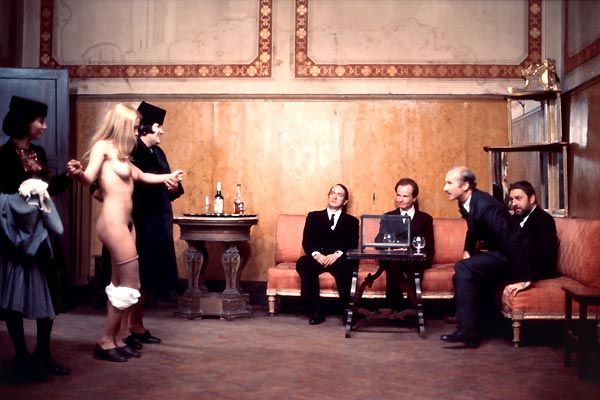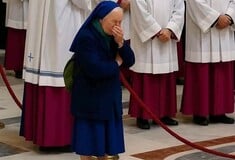'Εργα και ημέρες του Πιερ Πάολο Παζολίνι

Ο Πιερ Πάολο Παζολίνι γεννήθηκε στην Μπολόνια της Ιταλίας στις 5 Μαρτίου του 1922, χρονιά που ανεβαίνει στην εξουσία ο Μουσολίνι. Το γεγονός αυτό αποτελεί σταθμό και για την κοινωνική διάρθρωση της Ιταλίας που αλλάζει μορφή χάνοντας σιγά σιγά την αναγεννησιακή της παράδοση και καταντώντας χώρα μιας μάζας μικροαστών στα χέρια του μεγάλου κεφαλαίου και των μεγαλογαιοκτημόνων.
Πατέρας του ήταν ο Κάρλο Παζολίνι, υπαξιωματικός του πεζικού, γόνος παλιάς οικογένειας της Ραβέννας, της οποίας κατασπατάλησε τη μικρή περιουσία και κατατάχτηκε στο στρατό ως μοναδική λύση. Μητέρα του η Σουζάνα Κολούσι, από οικογένεια εύπορων αγροτών, δασκάλα, απ' την Καζάρσα του Φριούλι, ακριτική περιοχή της Ιταλίας στα σύνορα της πρώην Γιουγκοσλαβίας. Το επάγγελμα του Κάρλο Παζολίνι ως στρατιωτικού υποχρεώνει την οικογενειά του σε συνεχείς μετακινήσεις. Στο Κονιλιάνο του Μπελούνο γεννιέται, το 1925, ο αδερφός του Γκουίντο-Αλμπέρτο.
Γράφει ο Παζολίνι στον Αιρετικό Εμπειρισμό:
Την εποχή εκείνη τα πήγαινα ακόμα καλά με τον πατέρα μου. Ήμουνα ιδιαίτερα πεισματάρης και καπριτσιόζος (δηλαδή νευρωτικός), αλλά κατά βάθος καλός. Με τη μητέρα μου (έγκυο αλλά δεν το θυμάμαι) ήμουνα, όπως και σ' όλη μου τη ζωή, δεμένος με μια παθιασμένη αγάπη χωρίς ελπίδα.
Είναι αλήθεια ότι μάνα και πατέρας απ' τη νηπιακή ηλικία επηρεάζουν διαμετρικά αντίθετα και με καθοριστικό τρόπο την ψυχοσύνθεση του παιδιού. Ο πατέρας διοικεί την οικογένεια με στρατιωτικό τρόπο. Τυρρανικός κι αυταρχικός προκαλεί μόνο φόβο. "Γεμάτος πάθος, σεξουαλικότατος, βίαιος σαν χαρακτήρας" γράφει γι' αυτόν ο γιος του, "κατέληξε στη Λιβύη, χωρίς δεκάρα· έτσι άρχισε τη στρατιωτική καριέρα που τον καταπίεσε και τον παραμόρφωσε ψυχολογικά τόσο ώστε να τον σπρώξει στον έσχατο συντηρητισμό. Είχε ποντάρει τα πάντα πάνω στη φιλολογική μου καριέρα, από τότε που ήμουνα ακόμα παιδί, μιας και τα πρώτα μου ποιήματα τα έγραψα σε ηλικία εφτά χρονών. Είχε διαισθανθεί, ο κακομοίρης, αλλά δεν είχε προβλέψει τις ταπεινώσεις που θα συνόδευαν την επιτυχία μου". Αλλά το καθοριστικό πρόσωπο στη ζωή του είναι η γλυκύτατη μητέρα, μόνιμο αντικείμενο λατρείας, στην οποία θα αφιερώσει μερικούς απ' τους πιο δυνατούς του στίχους. Δεν είναι δύσκολο να καταλάβουμε, έστω κι απ' αυτές τις λίγες ενδείξεις, τα σημάδια ενός τεράστιου οιδιπόδειου συμπλέγματος, του οποίο ο Παζολίνι είχε μια σπάνια όσο και ακραία επίγνωση.
Τα πρώτα του ποιήματα γράφηκαν στο Σάτσιλε όπου ο Παζολίνι έβγαλε το δημοτικό σχολείο. Ύστερα ακολούθησαν άλλες μετακινήσεις: Κρεμόνα, Ρέτζο Εμίλια, όπου παρακολούθησε το γυμνάσιο και, τελικά, στη Μπολόνια το λύκειο Γκαλβάνι και κατόπιν το πανεπιστήμιο. "Ένα πανεπιστήμιο με δομή φασιστική", θα σχολιάσει αργότερα. "Εξαιρείται μόνο η προσωπικότητα του Λόνγκι που εκείνα τα χρόνια στην Μπολόνια πρόσφερε πολλά σε μένα και σε πολλούς άλλους, συνομήλικους και πιο μεγάλους από μένα"
Το 1942, ενώ ο πατέρας του βρίσκεται αιχμάλωτος στην Κένυα, ο Πιερ Πάολο με τη μητέρα του και τον αδερφό του καταφεύγουν στο σπίτι των Κολούσι στην Καζάρσα. Τα χρόνια εκείνα, με δικά του έξοδα, ο νεαρός Παζολίνι εκδίδει την ποιητική συλλογη Ποιήματα στην Καζάρσα, γραμμένα στη διάλεκτο του Φριούλι. Τον επόμενο χρόνο κάνει τη στρατιωτική του θητεία στο Λιβόρνο· λιποτακτεί μετά τις 8 Σεπτεμβρίου και ξαναγυρίζει στην Καζάρσα.
Το 1945 ο αδερφός του Γκουίντο δολοφονείται μαζί με άλλους συντρόφους του της αντάρτικης ομάδας Όζοπο, από Γιουγκοσλάβους αντάρτες. Το περιστατικό παραμένει μια από τις πιο μαύρες σελίδες στην ιστορία της ιταλικής αντίστασης. Το θάνατο του Γκουίντο τον κάνει ακόμα τραγικό το γεγονός ότι σε μια πρώτη φάση κατορθώνει να ξεφύγει πληγωμένος, αλλά προδίνεται, μπλοκάρεται και τελικά σκοτώνεται. Στα έργα του Παζολίνι βρίσκουμε μνήμες, πόνο, οίκτο και πένθος για το θάνατο εκείνο, ενω ο θάνατος του παλικαριού είναι ένα από τα πιο αγαπημένα και πονεμένα του θέματα στο Τα Παιδιά της Ζωής και στο Μια Ζωή Γεμάτη Βία, τα δύο μυθιστορήματα που έγραψε σε ρομανέσκο.
Τα χρόνια του Φριούλι
Με το τέλος του πολέμου ο πατέρας γυρίζει στην Καζάρσα. Το χάσμα ασυννενοησίας μεταξύ πατέρα απ' τη μια και μητέρας-γιου απ' την άλλη γίνεται ακόμα βαθύτερο. Την ίδια χρονιά ο Πιερ Πάολο παίρνει το δίπλωμα φιλολογίας απ' το πανεπιστήμιο της Μπολόνια με μια διατριβή πάνω στον Πάσκολι. Απ' το 1945 ως το 1949 διδάσκει στο γυμνάσιο του Βαλβασόνε, ενός μικρού χωριού κοντά στην Καζάρσα. Στις 18 Φεβρουαρίου 1945, ιδρύει με νεαρούς φοιτητές την Academiuta de lenga Furlana, μια μικρή ακαδημία σπουδών για τη γλώσσα και την κουλτούρα του Φριούλι. Η περίοδος του Φριούλι είχε σημαντική επίδραση στη ζωή του Παζολίνι ως διανοούμενου και ως ατόμου. Τα νεανικά αυτά χρόνια που έζησε στην αγαπημένη ατμόσφαιρα του χωριού, μελετώντας με πραγματικό ενδιαφέρον τις διάφορες εκδηλώσεις και εκφράσεις του αγροτικού κόσμου, θα τα μυθοποιήσει αργότερα (όπως θα μυθοποιήσει και τη νιότη του) και θα τα νιώσει αρχαϊκά, ιερά, αμόλυντα.
Αυτή την αρχαϊκή φρεσκάδα του κόσμου που έρχεται σε άμεση επαφή με τη φύση θα κάνει μοντέλο και σκοπό του και θα προσπαθήσει να τα μεταδώσει στους άλλους. Απ' τα βάθη των ημερών εκείνων από εκείνες τις ρίζες θα ξεκινήσει να ζωγραφίσει μια Ιταλία ταπεινή, πραγματική, καθημερινή, και στα τελευταία του πια γραπτά θα διαπιστώσει και θ' ανακοινώσει την εξαφάνιση της με τρόπο που συχνά θα ξεσηκώσει θύελλες αποδοκιμασίας και θα δημιουργήσει σκάνδαλο.
Στενά συνδεδεμένος με τον τρόπο που αυτός ένιωθε τον αγροτικό κόσμο είναι και ο τρόπος που παρατηρεί τον κόσμο του κουρελοπρολεταριάτου των συνοικισμών της Ρώμης. Σε μια συνέντευξή που δίνει στη La Stampa την Πρωτοχρονιά του 1975 μιλάει γι' αυτούς ακριβώς τους συνοικισμούς. "Ήταν ένας κόσμος περιθωριακός και τρομερός στη σκληρότητά του, αλλά διατηρούσε ένα δικό του κώδικα τιμής και γλώσσας ο οποίος δεν αντικαταστάθηκε με τίποτα. Σήμερα τα παιδιά των συνοικισμών τρέχουν με μηχανές και βλέπουν τηλεόραση αλλά δεν ξέρουν να μιλάνε, μόλις που καταφέρνουν να τραυλίζουν πια. Είναι το βασικό πρόβλημα όλου του αγροτικού κόσμου ή τουλάχιστον της κεντρικής και νότιας Ιταλίας". Σε γενικές λοιπόν γραμμές η λογοτεχνική και πολιτιστική ένταξη του Παζολίνι διαμορφώθηκε στην Καζάρσα. Τα ποιήματα που έγραψε ανάμεσα στα 1943 και 1949 με το γενικό τίτλο Το αηδόνι της Καθολικής Εκκλησίας, φανερώνουν όλα αυτά και ταυτόχρονα την πολιτική και πολιτιστική εξέλιξη του νεαρού συγγραφέα.
Την ίδια εκείνη περίοδο, μετά τους αγώνες των εργατών γης στο Φριούλι, γράφει την πρόζα Οι Μέρες του Αγαθού Ντε Γκάσπερι που αργότερα θα γίνει μυθιστόρημα και θα εκδοθεί το 1962 με τίτλο Το Όνειρο μιας Υπόθεσης.
Η φυγή στη Ρώμη
Τα χρόνια λοιπόν της Καζάρσα θα μείνουν αξέχαστα κι ανεπανάληπτα. Το ίδιο και η μετακίνηση ή η φυγή, όπως θα τη χαρακτηρίσει ο ίδιος, απ' τα μέρη εκείνα. Τις παραμονές των εκλογών του 1948 ένα αγόρι εξομολογείται στον παπά της Καζάρσα ότι είχε σεξουαλικές σχέσεις με τον Παζολίνι. Αυτόματα η ζωή του νεαρού καθηγητή γίνεται αδύνατη στο στενό περίγυρο του χωριού. Φεύγει με τη μητέρα του στη Ρώμη κι εκεί, ζει χρόνια πάρα πολύ δύσκολα. "Υπήρξα ένας απ' αυτούς τους άνεργους που καταλήγουν στην αυτοκτονία" θα πει αργότερα.
Στην αρχή έμενε στην Πιάτσα Κοσταγκούτι, μετά στο συνοικισμό Σαν Μάμολο, κοντά στις φυλακές Ρεμπίμπια. Ίσως αυτές οι αλλαγές διευθύνσεων για ένα άλλο συγγραφέα δε θα είχαν καμμιά σημασία, αλλά αυτοί οι τόποι, αυτά τα ονόματα είναι πολύ γνωστά στους αναγνώστες του καθώς και η Βία Φοντανεϊάνα όπου πήγε να κατοικήσει αμέσως μόλις καλυτέρεψαν λίγο οι οικονομικές του συνθήκες.
Το 1954 εκδίδονται τα ποιήματα που είχε γραψει στο Φριούλι, σε μια συλλογή με τίτλο Η Πιο Ωραία Νιότη. Δύο χρόνια πριν είχε δημοσιευτεί μια σημαντική μελέτη του πάνω στην ποίηση με διάλεκτο του 19ου αιώνα, που είχε γράψει σε συνεργασία με τον Μάριο Ντ' Άρκο. Το 1955, ο Παζολίνι ιδρύει και δουλεύει μαζί με τους Ροβέρσι, Λεονέτι, Ρομάνο και Φορτίνι το φιλολογικό περιοδικό Οφιτσίνα (Officina) που παρά τη μικρή διάρκεια (κλείνει οριστικά το 1959 μετά από ένα άρθρο που έγραψε ο Παζολίνι εναντίον του Πάπα Πίου ΧΙΙ) παραμένει μια σπουδαία μαρτυρία μιας μερίδας ιταλών διανοούμενων απέναντι σε προβλήματα που αντιμετωπίζoνταν απ' τους περισσότερους συντηρητικά και μονόπλευρα, χωρίς καμμιά εναλλακτική λύση. Το δοκίμιο Πάθος και Ιδεολογία και τα λυρικά κομμάτια του Η Θρησκεία των Καιρών μου, που εκδίδονται αντίστοιχα το 1960 και 1961, παραμένουν η σημαντικότερη συμβολή του Παζολίνι στο Οφιτσίνα. Το 1955 εκδίδεται το μυθιστόρημα Τα Παιδιά της Ζωής, που υπήρξε η πρώτη του συγγραφική επιτυχία.
Ο θάνατος του Παζολίνι
Ο Πιερ Πάολο Παζολίνι πέθανε στις 2 Νοεμβρίου 1975 στην παραλία της Όστια, κοντά στη Ρώμη, σε μια θέση χαρακτηριστική των μυθιστορημάτων του. Ο θανατός του ήταν δολοφονία. Ο Πίνο Πελόζι, συνελλήφθη και ομολόγησε τη δολοφονία. Τριάντα χρόνια μετά, το 2005, απέσυρε την ομολογία του, και υποστήριξε ότι άγνωστοι είχαν σκοτώσει τον Παζολίνι. Είπε ότι αναγκάστηκε να ομολογήσει γιατί υπήρχαν απειλές κατά του ίδιου και της οικογένειάς του. Η έρευνα σχετικά με τη δολοφονία Παζολίνι άρχισε εκ νέου μετά την αναίρεση του Πελόζι.
Είναι θαμμένος στην Καζάρσα, στο αγαπημένο του Φριούλι.
(Από το λήμμα της Wikipedia)

Salò: Breaking the Rules
By Naomi Greene
Aπο το σαιτ της Criterion Collection
The year before he made Salò, or The 120 Days of Sodom, Pasolini hinted at the scandalous contours his last film would assume. In the course of a 1974 debate, he declared that now, as never before, "artists must create, critics defend, and democratic people support . . . works so extreme that they become unacceptable even to the broadest minds of the new State." In large part, of course, Pasolini's demand for "extreme" works was fueled by his conviction that only such "unacceptable" art could resist being consumed by the hated world of neocapitalism that was fast destroying all he had known and loved. But it is also true that, long before he uttered these sentiments, he had written essays, made films, and taken stands that were deeply polemical if not always unacceptable. In short, decades before he became Italy's most notorious public intellectual—famous for taking one unpopular or "heretical" stand after another—he had displayed the ever constant desire, as he said, to "break the rules." There was never any doubt in his mind that, as he once declared, "the real Marxist must not be a good Marxist. His function is to put orthodoxy and codified certainties into crisis. His duty is to break the rules."
In terms of his cinema, the cries of outrage that greeted many of his films, to say nothing of the frequent bans and censorship they encountered, revealed his talent for breaking the rules. Even his first feature, Accattone (1961)—which depicted the life and death of a young pimp living on the ragged outskirts of Rome—provoked right-wing disturbances and sharply divided critical opinion. While critics on the right were disturbed by the "amoral," "decadent," and "depraved" nature of Pasolini's protagonist—as well, perhaps, as Pasolini's evident attraction to the young men he portrayed—those on the left felt that the director's poetic, death-haunted, fatalistic, and often Catholic-inflected vision subverted any Marxist impetus for social change or social justice. Toward the end of the 1960s, Teorema (1968)—a film in which a handsome, "divine" stranger sleeps with the four members of a bourgeois family (mother, father, son, and daughter)—seemed to deliberately court controversy. Not only did it conflate homosexuality and heterosexuality but, also, it shadowed both with the hint of incest, insofar as the stranger acts as a son in the family. Temporarily banned for obscenity and apparently deemed an "inadmissible" film by the pope himself, Teorema was denounced as a homosexual fantasy and a film on the difficulty of being a homosexual. In the course of the early 1970s, the films of the so-called "Trilogy of Life"—that is, The Decameron (1971), The Canterbury Tales (1972), and Arabian Nights (1974)—shocked the public with an explicit depiction of sexuality never before seen in mainstream Italian films.
Still, even those well acquainted with Pasolini's taste for controversy could hardly have expected the extreme nature of Salò. Based on the Marquis de Sade's most notorious book, The 120 Days of Sodom, Salò is not only Pasolini's most "unacceptable" work but one of the most chilling films in the history of cinema. Just a few weeks after completing the film, moreover, on November 3, 1975, in an eerie echo of several scenes in his films, the director was found brutally murdered on the squalid outskirts of Rome. The scandalous nature of his death—the ostensible assailant was a young male prostitute, although many feel that his murder was an assassination orchestrated by people in power—heightened the scandal raised by the film. Alongside Salò lay grisly and unforgettable newspaper photographs of Pasolini's bloody and disfigured corpse. The line between art and life seemed to dissolve.
The film's producers had to fight a long and complicated battle with various boards of censorship, as well as the public prosecutors of several cities (including Rome and Milan), before the film could be officially shown in Italy. Suppressed by the censors before it could open—it was seized on November 12, 1975—it actually had its first public projection not in Italy but in Paris, on November 23. Early the next year, on January 11, 1976, it was briefly shown in Milan, before being blocked once again; on March 11, 1977, it was finally released in Rome for the first time, but with four sequences omitted. Three months later, a Milan court removed the ban against Salò. And on February 15, 1978, the four previously censored sequences were restored on the grounds that the film was a "work of art." (Throughout this time, there were always renegade prints circulating among private political and arts groups.) In other countries, of course, the film faced similarly protracted censorship battles.
With Salò, Pasolini managed to shock and disturb—albeit for different reasons—both the popular audience and the most serious critics. Ordinary Italian viewers, who doubtless hoped for still another erotic film from the director of the trilogy, were brought up short by its graphic sadism and icy violence. When I finally saw Salò in my Roman neighborhood movie house, I remember hearing cries of "brutto" (ugly) from dismayed and disappointed viewers. While Pasolini's earlier films had left much of their violence to our imagination, in Salò every horrible detail was cherished and prolonged: the camera lingers on the blood oozing from the victims' mouths when forced to swallow food spiked with nails, and on the excrement smearing their lips when obliged to eat excrement. As far as Pasolini's depiction of sexuality is concerned, even when, as in the films of the trilogy, he had declared his intention to portray Eros in a joyous light, he had allowed us to glimpse the dark underside of sexuality. And Salò, after all, was conceived as the mirror image, the infernal opposite of the trilogy; it was designed to show not the joy of sex but, rather, the commodification, the reification, of the human body in the unreal world created by neocapitalism.
As the years went by after his death, Pasolini was sometimes accused of rendering sadism erotic, in the manner, say, of other films set in the Fascist era (Liliana Cavani's The Night Porter, 1974; or Lina Wertmüller's Seven Beauties, 1975). "Like Cavani's Night Porter," wrote feminist critic Nancy Huston, "Pasolini's film is an unfortunate attempt to reinject eroticism into genocide." But the truth is, I think, that Pasolini attempted to remove every cloak, every veil, conferred upon sadomasochism by a tradition of romance or pornography. In Salò, sexuality is not titillating or exciting; it is graphic and brutal, calculated and cold. His libertines are neither Sade's aristocrats nor Byron's satanic heroes who defy society but meticulous, grotesque bureaucrats who are driven by frustration and impotence rather than desire. As for their nude and passive victims, they are no more than interchangeable and anonymous bodies. Similarly, the elegant villa where the libertines pursue their obsessive sexual games and combinations is less a house of pleasure than a death laager from which no escape is possible. Several critics did, in fact, perceive that Pasolini's film was not about sex but, rather, "the death of sex." Cesare Musatti and Henry Chapier called it a "funeral dirge" of eroticism; French philosopher Gilles Deleuze would later deem the film a "theorem of death." But perhaps the mass public understood this best: while it flocked to The Night Porter and Seven Beauties, it shunned Salò.
If ordinary Italian viewers were repelled by the violence and the brutal, clinical cast of the sexual acts depicted in the film, Pasolini's more serious critics were dismayed instead by the implicit political analogy at the heart of Salò. That is, by situating people and actions imagined by the Marquis de Sade in the Republic of Salò—the short-lived state set up by Mussolini in the Northern Italian town of Salò after his flight from Rome in 1943—Pasolini appeared to draw a parallel between the imaginary sadism of the libertines and the all-too-real phenomenon of Italian Fascism. As if anticipating reactions to this very charged comparison, before even completing the film Pasolini attempted to justify his decision to set Sade's novel in the Fascist era. He insisted that he was not talking about, or not talking solely about, the abuses of Nazi-Fascist power but of all power—including what he called the "new Fascism" of contemporary neocapitalism. Defiantly calling Salò his "first film about the modern world," at one point he insisted that his work was the oneiric "representation of what Marx called the commodification of man, the reduction of the body (through exploitation) to a thing. Therefore sex is still called upon in my film to play a horrible metaphorical role. Precisely the contrary of the trilogy." His argument that the Fascism of Salò was merely symbolic did not convince several important cultural critics, however. The respected Italian novelist Italo Calvino doubtless spoke for many when he declared that "the idea of situating Sade's novel in the times and places of the Nazi-Fascistic republic seems the worst possible one from all points of view. The horror of that past that is in the memory of so many who lived it cannot serve as background to a symbolic and imaginary horror constantly outside the [realm] of the probable." Along somewhat more theoretical lines, French critic Roland Barthes declared that one cannot anchor the abstract notion of power (what he called "Fascism-substance") in any concrete historical event such as Nazism-Fascism without distorting its nature.
Not all Italian critics, of course, were caught up in the political polemics and existential attacks that swirled around Salò. Still, it was in France—the country of Sade if not of Pasolini—that critics seemed most willing to treat Salò as an important work of art. Marcel Martin, for one, in July 1976 expressed his conviction that Salò was nothing less than the "greatest" and most "ambitious" of all of Pasolini's films. It was, he said, "a film as glacial and opaque as marble, as pure and cutting as diamond." Pointing to the radical nature of Salò, that same month, in Cahiers du cinéma, Serge Daney underscored Pasolini's total refusal of all the strategies designed to signal a filmmaker's "desire to seduce and corrupt" the viewer. The respect and admiration for Pasolini that echo through these remarks would be heard, years later, in a moving and important tribute to him by still another French critic and writer—Guy Scarpetta. Commenting on the many articles and books devoted to Pasolini on the thirtieth anniversary of the poet's death, in a 2006 piece published in Le monde diplomatique, Scarpetta stressed the lasting importance and resonance of Pasolini's "hereticism." Pasolini's role, declared Scarpetta, "was to subvert conceptions of the dominant world, to explore all that is not said by conventional representations, to uncover all that is repressed in the social and cultural consensus." No work, certainly, better illustrates Pasolini's challenge to conventional representations, to the social and cultural consensus, than does Salò.
























